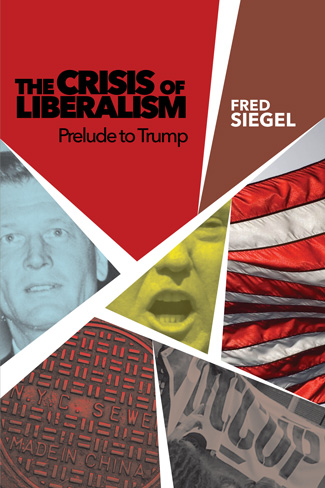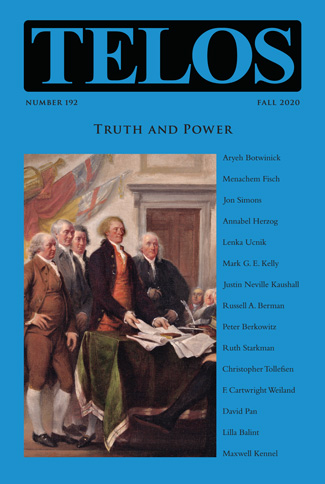Nietzsche once said that culture was only a thin apple peel over a glowing hot chaos. That is probably to say that even a small shock suffices to confront us anew with barbarism and dizzying stupidity. And now we are actually dealing with a worldwide pandemic. In effect, the thin apple peel tore at once and an abyss of the most dangerous folly has opened up. Thus one headline read in the weekly newspaper Die Zeit: “Mankind takes a break—the planet exhales.” One might simply accept as childish impudence calling the lockdown, the curfew that has practically brought the entire global society to a standstill, a “break.” But the madness lies in the presumptuousness of assuming a perspective above humans and of making oneself the voice of the “tortured” earth. Giovanni di Lorenzo, an intelligent, educated man, is the editor-in-chief of that newspaper. But today he evokes Hermann Melville’s captain Benito Cereno: The barbarians have his ship in their hands—and he can do nothing about it.
|
The following essay originally appeared on June 12, 2020, at Religion Unplugged. Reposted here by permission. For more than a week, hundreds of thousands of Americans, black and white, have taken to the streets across the country in an enormous outpouring of pain and rage. People, throughout the nation, primarily youth and of every race and ethnicity, have been responding to the vicious murder of George Floyd in Minneapolis on Memorial Day. Their powerful emotions have overwhelmingly been channeled into protests in over 75 cities. Starting in Minneapolis and spreading to cities as far-flung as Atlanta, Boston, New York, Chicago, and Los Angeles and even to London and Paris, people have gathered in large numbers from coast to coast, in the north and south. The vast majority of protesters have been peaceful, and the events themselves have generally been nonviolent throughout their scheduled duration. However, a smaller number of rioters have resorted to shocking levels of violence, often after the official end of the protest. Their actions have been extremely destructive and deeply troubling: police cars have been burned; police officers have been pelted with projectiles; a police precinct in Minneapolis was torched; small businesses have been destroyed. In many cities such as Boston, some police officers have shown great restraint in the face of insults and harassment. But in almost every city, we have seen arrests and the use of violence against peaceful protesters, notably in the nation’s capital, Washington, D.C. Now available from Telos Press Publishing: The Crisis of Liberalism: Prelude to Trump, by Fred Siegel. Order your copy today in our online store and save 20% off the list price. Also available in Kindle ebook format.
by Fred Siegel In The Crisis of Liberalism: Prelude to Trump, Fred Siegel leverages New York City to uncover the key political conflicts and social contradictions in American liberalism over the last century. This wide-ranging collection of essays critically recounts how passionate intellectual debates over how to realize “the good life” in the modern city emerged from the writings of early progressive “thought leaders,” who envisioned a new educated elite capable of enlightened democratic governance. The flaws in this approach, as Siegel shows, expressed themselves most floridly in John Lindsay’s New York, whose flashy limousine liberals were a preview of today’s politically correct gentry liberalism. Its cultural programs over the past half-century repeatedly failed the downtrodden underclass and alienated middle-class New Yorkers trapped in economic stagnation. By neglecting voters’ real concerns over illegal immigration and China’s emerging threats, globalist technocratic liberals ultimately set the stage for Donald Trump’s angry nationalist demand to put “America First.” Telos 192 (Fall 2020): Truth and Power is now available for purchase in our store. Individual subscriptions to Telos are also available in both print and online formats.
First, there are natural scientific truths that even autocrats and totalitarians do not seek to deny, as they are the source of the technological tools that can support any attempt to maintain power. Here, there is certainly no conflict between truth and power. Not only does political power depend on technological achievement, but natural scientific facts cannot be covered up by lies and ideology for long. Consequently, political actors must pay attention to natural scientific and technical knowledge, even if they then instrumentalize it in different ways. Worse than the concrete fear of some life-threatening reality, such as in the past the Spanish flu or today COVID-19, is the anxiety nourished by the imagination of terror. This is the business of the modern prophets of the apocalypse, who usually show up in the guise of science. They lend support to the great religion-substitute of an infinite environmentalist worry, with which the Party of Prohibitions exploits the guilty conscience of an affluent society. Instead of “What can I hope for?”—a question for which one used to expect an answer from Christianity—they ask: “What must I fear?” This accords to the presumed wisdom of children who want to carry out a world tribunal to save the earth. Now available for pre-order from Telos Press Publishing: The Crisis of Liberalism: Prelude to Trump, by Fred Siegel. Pre-order the paperback edition today in our online store and save 30% off the list price. Offer expires 9/30/20. Also available now in Kindle ebook format. Release dates: October 1, 2020 (paperback), September 15, 2020 (ebook).
by Fred Siegel In The Crisis of Liberalism: Prelude to Trump, Fred Siegel leverages New York City to uncover the key political conflicts and social contradictions in American liberalism over the last century. This wide-ranging collection of essays critically recounts how passionate intellectual debates over how to realize “the good life” in the modern city emerged from the writings of early progressive “thought leaders,” who envisioned a new educated elite capable of enlightened democratic governance. The flaws in this approach, as Siegel shows, expressed themselves most floridly in John Lindsay’s New York, whose flashy limousine liberals were a preview of today’s politically correct gentry liberalism. Its cultural programs over the past half-century repeatedly failed the downtrodden underclass and alienated middle-class New Yorkers trapped in economic stagnation. By neglecting voters’ real concerns over illegal immigration and China’s emerging threats, globalist technocratic liberals ultimately set the stage for Donald Trump’s angry nationalist demand to put “America First.” |
||||
|
Privacy Policy · Data Protection Copyright © 2026 Telos Press Publishing · All Rights Reserved |
||||




